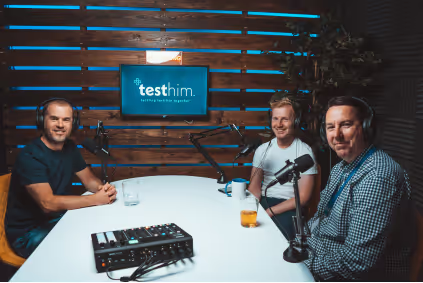Male fertility has been overlooked for far too long despite there now being plenty of evidence to support the fact that improving quality of sperm improves outcomes for natural conception, IVF/ICSI and reduces miscarriage rates.
The sad thing about this is that men can feel that their input and importance is undervalued, and then feel excluded from further investigations, when the facts are that fertility issues and recurrent miscarriage can be 50% male factor. The key to success is achieving as good quality sperm and eggs as is possible.
What we also know is that despite sperm being delicate and easily damaged, there is much that can be done to improve both quality and quantity. Sperm quality can be affected by diet, poor sleep, high stress levels, heat, some forms of exercise and these can be fairly easily remedied.
It then becomes just as important that men are aware that taking care of themselves, just as much as women do, can make a difference not only to their health and well-being, but the quality of their sperm. It is exciting to see so many advances being made in terms of testing and support in this area. Men deserve help, support, information and investigation as much as their partners and the more that health professionals can do to make that easily accessible the faster we’ll see improvement in outcomes.
Reproductive reflexology is one such form of support that can be useful for both men and women when they are trying to conceive, and research is beginning to show that it can be a useful asset in your toolbox.
We know that one thing reflexology can do is help with reducing or managing stress levels and this in itself can play a big role in improving the quality of sperm by reducing levels of oxidative stress. Reflexology itself, which involves placing pressure on small, specific areas (reflex points) of the feet/hands/ears, can also be very relaxing.
How do we know if reflexology is having a positive effect?
Generally, you should feel better, sleep usually improves and symptoms of stress and maybe other underlying conditions decrease. However, we also like to rely on testing to help us to structure the most appropriate treatment protocols and to monitor and measure outcomes. So, like other health practitioners we like to use Semen Analysis and Sperm DNA Fragmentation testing to help us to understand where the issues may be and repeat testing to measure progress.
The Association of Reproductive Reflexologists have carried out several studies that have helped to develop this practice.
Our first data collection undertaken in 2013 looked at 183 patients who were using reflexology whilst trying to conceive. They were aged between 24-46 and the pregnancy rate was 68%, in addition the IVF/ICSI success rate was doubled from 25% to 52%. As you can imagine the greater percentage of patients were female but the data we have involving men was also interesting and demonstrated an increase in both sperm motility and morphology and positive outcomes in terms of pregnancy.
We also collaborated on an abstract in 2021 with Mr Bryan Woodward, Embryologist and CEO of X&Y Fertility, to look at the kinds of patients who might be using reflexology as part of their treatment program whilst trying to conceive. This was presented as a poster presentation at Fertility 2022. Again, the majority of the participants were women but there was a small percentage of male participants. This second study was entitled ‘Patient Perceptions of the Role of Reflexology as a Complementary Therapy to Assist Conception’.
The study was designed as a prospective longitudinal audit of the views of people having reflexology whilst attempting to become pregnant. 117 patients from four countries were interviewed, (UK, Ireland, Australia, and UAE) and these views were evaluated using descriptive statistics. 84.7% sought reflexology to assist fertility and relieve stress, 9.9% specifically stated it was used to support their IVF treatment. 43.1% had previously received fertility treatment. They were represented as follows, 49.6% had no children, 31.9% had one child, 15% had two or more children. 68.1% were educated to degree level. 89.6% felt reflexology was having a positive effect on their fertility. In conclusion most people reported a positive effect of reproductive reflexology on their fertility journey, indicating that there was a role for this as a therapy in helping people to conceive.
The most recent paper was completed in January 2023 and was a small phenomenological study designed to hear the patient experience of those using reflexology as part of their journey to parenthood. Four participants were interviewed, three females and one male.
Any identifying factors were removed and participants were anonymised. I would like to share some of the direct comments of the male participant in his own words.
This participant reported the benefits of an integrative approach using reflexology. This particular practitioner referred the patient for further, albeit private practice, medical testing as they felt this was warranted. It proved to be in that case that a result had been missed and the patient was treated medically for this. This particular participant had conceived after using reflexology to support fertility after trying for some while to have their first baby and returned to the same practitioner when trying for a subsequent child.
‘When I first went for a consultation I went completely open minded, I knew what reflexology was but didn’t really know much else, so at that point I guess hoped to gain some help with conceiving.’
‘There didn’t seem to be any downsides to giving reflexology a try. It was not like having any intense intervention or actually having to take a drug or anything like that. I was having what could be considered a massage but it could have these incredible benefits, so it didn’t really feel like there was anything to lose and potentially could be beneficial.’
‘It was like having a relaxing massage with therapy, plus the bonus of de-stressing and calming benefits too. I felt like I was in a process that could help lead to conception. I’d already made some lifestyle changes but did feel, if I go and commit time and money to this process then I’m kind of making my whole journey with it more of a solid thing that I’m doing, rather than it being just me trying to make a few changes and hoping that would sort it out. It’s kind of like joining a program.’
‘We had actually been to see the specialist at the hospital and were referred by the GP to go and see the fertility clinic. That was very frustrating because they didn’t seem to really want to do any kind of holistic thinking or further investigations. You're fine, you can conceive and if you can’t we can start IVF, so there’s your two options.’
‘It definitely felt like a safe space and I can’t see where that safe space would really be for a man struggling to conceive. I’ve tried talking to friends about our difficulties trying to conceive but I found it really hard. Once I’d opened up to my reflexologist about it, I felt more confident to speak openly to others. I certainly didn’t have any real knowledge about male fertility before going to see her so I don’t think we would have talked about it or would have brought it up with someone if they didn’t have much knowledge around it.’
‘I had a sperm test which came back pretty fine but the reflexologist spotted raised white blood cells, so she suggested I go for some further tests. I had bacteria present, which the GP and hospital hadn’t noticed, and was treated with antibiotics.’
‘I really felt like I wanted to shout about reflexology to anyone who said they couldn’t conceive or were struggling as it helped me so much.’
Whilst reflexology, or any other form of complementary therapy might not suit all patients, it can be a useful form of support and provides a means of reducing stress and an integrative approach to fertility.
I like to think of it as a patient-centred, integrative approach to provide a truly holistic approach to fertility issues. It puts you, the patient, at the very centre of the picture and ensures an individualised approach that can involve recommendations to visit your GP, referrals to specialists in male fertility, changes to diet and lifestyle, referral to a nutritionist and a means of reducing stress, inducing relaxation and not least time-out for an hour!
The Association of Reproductive Reflexologists was formed in 2011 and provides practitioners with a high standard of education and ongoing training and support in this specialism. This enables them to provide the best possible support for their clients.















.png)


